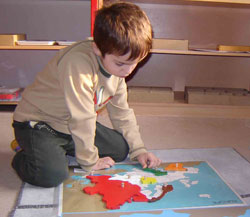 When parents hear the term Montessori they normally have some idea of what it means or what Montessori Education is about. However, all too often, many parents develop misconceptions about the method when receiving information handed down from sources outside their Montessori school. This may be why many myths regarding the method arise.
When parents hear the term Montessori they normally have some idea of what it means or what Montessori Education is about. However, all too often, many parents develop misconceptions about the method when receiving information handed down from sources outside their Montessori school. This may be why many myths regarding the method arise.
When you tell a friend or acquaintance that your child attends a Montessori Preschool, what kind of response do you typically get? Is it difficult to explain the method or to rebut a common myth? After talking to parents for many years we know that it isn’t easy to describe what happens in your child’s classroom. Therefore, we would like to help by explaining a few of these myths in hopes of providing you with some easy explanations.
Montessori in this article refers to a method of child development based on the work of Dr. Maria Montessori. She discovered that children loved to be involved in meaningful and self-directed activities. When provided with the right environment, guidance and materials, children developed self-confidence and a natural love of learning.
While there are many myths or misconceptions of Montessori methodology, we will examine a few here in order to provide a better understanding of the foundation of the Montessori Philosophy and the genius of its approach.
Some of the most common myths or misconceptions of the Montessori Method include:
- Montessori Kids do whatever they want
- Montessori Schools are only for rich or smart kids
- Montessori Classrooms are too structured or not structured enough
- Montessori Classrooms don’t allow for play
- Montessori is just some special materials
-
Montessori kids do whatever they want:
Yes and No. Montessori children do have the freedom to choose from the learning based materials that are provided for them throughout the classroom. These materials are normally referred to as “Activities” or “Work.” Each Work is displayed and organized neatly and orderly on shelves in a logical progression of learning. Each Work is self-correcting, allowing the child the joy of figuring out solutions on their own with joyful exploration. Montessori children engage in whatever Work they want based on freedom of choice and self-correction.
Montessori children are taught to respect themselves, their friends and the materials in the classroom. Mistreating friends or materials is not okay. Montessorians refer to this approach as “freedom within limits.” -
Montessori Kids are for Rich or Smart kids:
Montessori education philosophy can work for most children regardless of their social – economic circumstance or their IQ. Montessori children may seem advanced for their age simply because a child’s sensitive periods of learning are nurtured at the right time, allowing a child to absorb the world around them and find ways to express themselves and their own innate intelligence.< br />
Most Montessori schools are private options but with 500 Montessori schools in Canada, more are becoming publicly funded. When looking at preschools that are paid for by parents, the costs for Montessori preschool education are in line with other preschool or daycare options.
Some families choose take advantage of scholarships or income assistance programs. -
Montessori Classrooms are too structured or not structured enough:
Montessori Classrooms are deliberately prepared for the child to observe, choose, explore and discover in an environment build for them. This preparation allows the child to help themselves and allows for a natural progression of learning, which promotes independence, pride, and self-discipline. Montessori teachers are observers who guide children by offering presentations of activities and are present to assist a child if they ask for help, want to explore further, or need refocusing. While this structure is not the same as the conventional classroom structure, it is a structure that better supports the individual learning of each child.
-
Montessori Classrooms don’t allow for play:
Montessori children love what they do. Montessori teachers and children refer to the activities, learning and engagement in the classroom as work. Their work is their play. Children have a deep desire to contribute meaningfully and we can easily dismiss our children’s desires if we don’t value their work. Remember the term “work” is a positive and confidence building word that gives the child pride in their learning and achievement. Montessori Environments and teachers are working to help bring your child into a state of Joyful Learning. We have all witness this Joy when we notice a child’s deep concentration when solving a problem they have been working on, and the smile that comes once this task achieved on their own.
-
Montessori is just some special materials:
While the materials used in a Montessori environment are specially designed through tremendous thought and revision to develop a child’s power of observation through the senses, Montessori is more than just a handful of wooden toys. Along with each specifically designed material, there is also; specifically trained teachers, quiet demonstrations, an environment laid out to offer progressive learning, and freedom of choice, which as a whole allow children to; build confidence, sense of self, and a natural love for learning.
These were just a few of the misconceptions we hear. For more resources and information, here are a few articles to check out:
http://nurtureandnature.co.za/montessori-myths.php
http://www.montessorisociety.org.uk/article/how-important-are-montessori-materials
http://www.valleymontessorischool.com/admissions/montessori-myths
http://www.pacificriminternationalschool.org/about-prints/myths-of-montessori.html
http://www.mountainshadows.org/?p=1878
